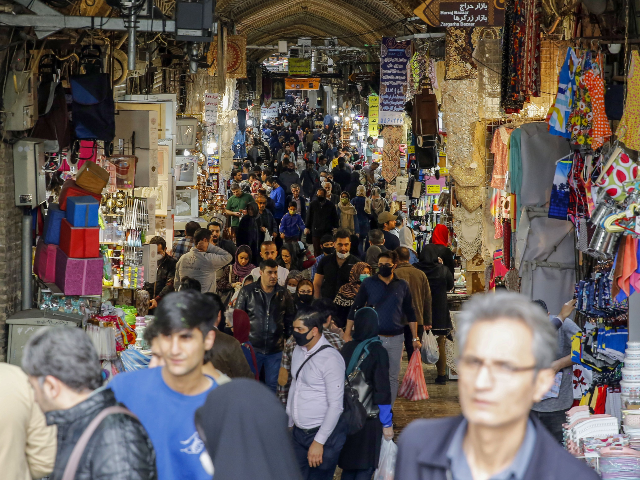The National Council of Resistance of Iran (NCRI), Iran’s largest dissident organization, revealed that, by its tally, over 50,000 people have died in the country as a result of the Chinese coronavirus as of Sunday.
The NCRI – using sources communicating with the People’s Mojahedin Organization of Iran (PMOI/MEK), its wing active within the country – has kept its own independent log of confirmed deaths as a result of coronavirus infection since the outbreak first picked up speed in the country in March. Iran is considered the most severely affected country in the Middle East by the pandemic largely as a result of a slow and ineffective response to rising numbers of infected in the country.
Iran: Coronavirus death toll exceeds 50,000 in 325 cities
The People’s Mojahedin Organization of Iran (PMOI / MEK) announced on Sunday, June 7, 2020, the #Coronavirus death toll in 325 cities across #Iran has risen to 50,080. #COVID19 https://t.co/yL2QeacNkI pic.twitter.com/cfkvpDtcdt— NCRI-FAC (@iran_policy) June 7, 2020
The Iranian Islamic regime claims that slightly over 8,000 people have died of coronavirus in the country. It has boasted of having a better response to the pandemic that most world powers and credited the Islamic Revolutionary Guard Corps (IRGC), its terrorist military wing, for protecting the public from the virus.
At the local level, Iranian officials have complained that the official nationwide numbers of coronavirus cases and deaths are smaller than the sum of the totals local officials had tallied in their own provinces. Some have openly criticized the government for its poor handling of the crisis and accused it of
The NCRI noted in its report Sunday that the death toll in Tehran is over 10,000 people, by far the largest of all provinces, given its population density. Another province that reportedly is struggling to keep up with the rise in cases is Hormozgan, where the NCRI cited state-run news to quote its governor confirming that the province’s hospitals have run out of intensive care unit beds. Other regions, like Iran’s Kurdistan province, are reportedly experiencing what authorities are calling a “second wave” currently rising after a dip in the number of coronavirus diagnoses.
The Iranian regime has repeatedly applauded itself for its handling of the pandemic. On Monday, the Health Ministry confirmed 70 new deaths in a 24-hour period and slightly over 2,000 new cases. Tehran claims 8,351 people have died nationwide, less than five times the number that NCRI has documented. The new numbers indicate an acceleration in the spread of the virus, unlike the downward trend many countries that began diagnosing coronavirus cases at the same time that Iran did are currently seeing.
“Iran sees an upward trend in daily infections in many provinces, especially in the southwestern Khuzestan province,” Turkey’s state-run Anadolu Agency reported on Monday. “Iran’s daily number of COVID-19 [Chinese coronavirus] cases dropped to around 800 in early May, but daily figures show an upward trend in recent days after authorities took measures to ease restrictions.”
Iran’s Health Ministry spent much of the weekend applauding itself but warning residents to use sanitary masks due to the new cases. Health Minister Saaed Namaki remarked on Sunday that Iran was “able to manage the coronavirus outbreak and within 60 days turn from an importer of medical equipment and necessary items such as masks into a manufacturer and later an exporter,” according to the Iranian outlet PressTV.
“It was another sign of great honor that will shine in the history of the country, which at the height of the sanctions, was able to get itself together in less than two months and turn into an exporter of masks, medicine and disinfectants,” he claimed.
In May, Namaki declared that Iran had “outperformed the most powerful countries” in the world on coronavirus response. Last week, observing the recent increase in cases, he chastised the Iranian people for being “completely careless” in practicing social distancing.
In contrast to Namaki’s message, Health Ministry spokesman Kianush Jahanpur – who in the past has publicly condemned the government for allowing mass funerals of jihadists during the height of the pandemic – urged Iranians on Monday to take care to cover their faces in public and practice social distancing.
“Everyone should wear masks when attending public places like shops or any other places where fully observing social distancing is not possible,” Jahanpur said.
Iran tasked the IRGC with much of the country’s response to the virus, meaning a U.S.-designated terrorist organization was asked to develop a coronavirus vaccine and attempt to keep hospitals stocked and prepared. The IRGC has not offered any updates since March about its alleged vaccine development. IRGC Major General Hossein Salami claimed that, in addition to the questionable vaccine, the jihadists had developed a “magnetic bipolar coronavirus remote detector,” which allegedly detects the virus using a magnetic field. There is no evidence the device functions as Salami described and some observers noted it bore a striking resemblance to alleged “bomb detectors” previously used to scam foreign investors.
Neither the World Health Organization (W.H.O.) nor any other global health agency or medical device company has confirmed the effectiveness of the device. Iran has also received no outside confirmation that its alleged vaccine development is advancing.

COMMENTS
Please let us know if you're having issues with commenting.